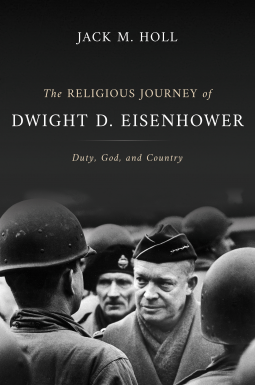
The Religious Journey of Dwight D. Eisenhower
Duty, God, and Country
by Jack M. Holl
This title was previously available on NetGalley and is now archived.
Send NetGalley books directly to your Kindle or Kindle app
1
To read on a Kindle or Kindle app, please add kindle@netgalley.com as an approved email address to receive files in your Amazon account. Click here for step-by-step instructions.
2
Also find your Kindle email address within your Amazon account, and enter it here.
Pub Date Oct 19 2021 | Archive Date Nov 05 2021
Talking about this book? Use #TheReligiousJourneyofDwightDEisenhower #NetGalley. More hashtag tips!
Description
Series: Library of Religious Biography
“Our form of government has no sense unless it is founded in a deeply felt religious faith, and I don’t care what it is. With us, of course, it is the Judeo-Christian concept, but it must be a religion that all men are created equal.”
So said Dwight D. Eisenhower shortly after being elected president of the United States in 1952. Although this statement has been variously interpreted, it reflects one of his fundamental guiding principles: that for a country to thrive, it needs a shared identity, formed through common values, history, and purpose. For Eisenhower, this could be found most distinctly in shared faith—a concept that came to be known as American civil religion, which defined and drove much of the cohesion of the 1950s under Eisenhower’s leadership.
This biography tells the story of how deeply religious convictions ran through every aspect of Eisenhower’s public life: his decision to become a soldier, his crusade against fascism and communism, his response to the civil rights movement, his belief that only he as president could lead America through the Cold War, and his search for nuclear peace. Having been brought up in a devout family—first as part of the River Brethren and later Jehovah’s Witnesses—Eisenhower continued to see the world in terms of a dialectical struggle between divine and demonic forces throughout his life, even after joining the Presbyterian church. This perspective shaped his public image as a general in World War II and as president during some of the coldest years of the Cold War, when cultural differences between the atheistic Soviet Union and the religiously grounded United States began crystallizing.
As Eisenhower’s historical standing continues to rise, and his contrast with the modern Republican Party deepens, Jack Holl’s study of this consequential figure of twentieth-century American history shines a spotlight on what has changed in the intervening years. What can be learned from the religious outlook of a public servant who embraced moderation instead of partisan division? Which beliefs and convictions led a former general to a position of skepticism against the military-industrial complex? With the role of faith in American political life still a hotly debated topic today, Eisenhower’s religious journey is worth renewed attention.
Table of Contents
Introduction: The Eisenhower Era
1. Inauguration, January 1953
2. The Man from Abilene, 1890–1909
3. Duty, Honor, Country, 1909–1920
4. Fox Conner’s Premonitions, 1921–1939
5. Crusade in Europe, 1940–1946
6. The Most Intensely Religious Man, 1946–1952
7. In God We Trust, 1952–1955
8. One Nation, Indivisible, 1954–1958
9. The Iron Cross, 1953–1961
10. Abilene, End of the Trail, 1961–1969
Epilogue: Civil Religion, Church, State, and the Place of Meditation
Available Editions
| EDITION | Hardcover |
| ISBN | 9780802878731 |
| PRICE | $29.99 (USD) |



